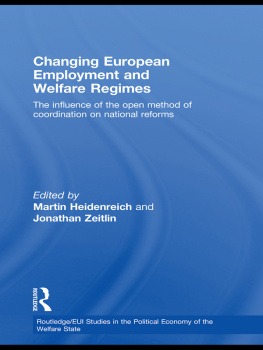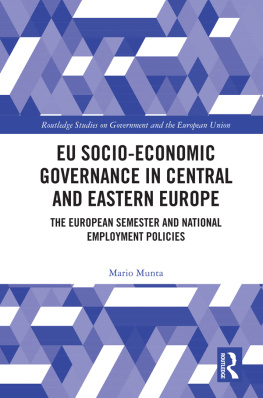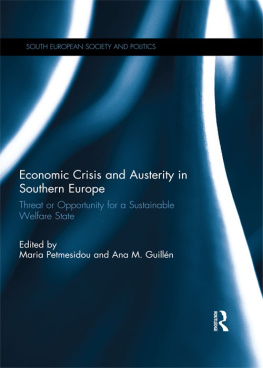Changing European Employment and Welfare Regimes
This book examines how and to what extent the European Employment Strategy and the Open Method of Coordination (OMC) on Social Protection and Social Inclusion have influenced national labour market and social welfare policies.
Focusing on the implementation of the OMC in different national environments, this book examines how the proposals and targets of the OMC are interpreted and implemented within the context of existing national employment and welfare regimes. At a theoretical level and on the basis of national case studies, the book considers how OMC objectives, guidelines, targets, and recommendations may reshape the domestic institutional framework, how learning and participation of governmental bodies are organized across different hierarchical levels, and how non-state actors may be involved in the formulation and implementation of national reform plans. The authors conclude that the OMC has contributed significantly to both substantive and procedural reforms, in spite of the many institutional barriers to Europeanization in this policy area.
Featuring comparative case studies across a number of European states, this book will be of interest to students and scholars of sociology, political science, public policy, and international relations.
Martin Heidenreich is Founding Director of the Jean-Monnet Centre of Europeanization and Transnational Regulations and Jean-Monnet-Professor of European Studies in Social Sciences at the University of Oldenburg, Germany.
Jonathan Zeitlin is Founding Director of the European Union Center of Excellence and Professor of Sociology, Public Affairs, Political Science, and History at the University of Wisconsin-Madison, USA.
Routledge/EUI Studies in the Political Economy of Welfare
Series editors: Martin Rhodes & Maurizio Ferrera,
The European University Institute, Florence, Italy
This series presents leading edge research on the recasting of European welfare states. The series is interdisciplinary, featuring contributions from experts in economics, political science and social policy. The books provide a comparative analysis of topical issues, including;
- reforms of the major social programmespensions, health, social security
- the changing political cleavages in welfare politics
- policy convergence and social policy innovation
- the impact of globalisation
- Immigration and Welfare
Challenging the Borders of the Welfare State
Edited by Michael Bommes & Andrew Geddes
- Renegotiating the Welfare State
Flexible Adjustment through Corporatist Concertation
Edited by Frans van Waarden & Gerhard Lehmbruch
- Comparing Welfare Capitalism
Social Policy and Political Economy in Europe, Japan and the USA
Edited by Bernhard Ebbinghaus & Philip Manow
- Controlling a New Migration World
Edited by Virginie Giraudon and Christian Joppke
- The Moral Economy of Welfare States
Britain and Germany Compared
Steffen Mau
- Welfare State Reform in Southern Europe
Fighting Poverty and Social Exclusion in Italy, Spain, Portugal and Greece
Edited by Maurizio Ferrera
- Normative Foundations of the Welfare State
The Nordic Experience
Edited by Nanna Kildal and Stein Kuhnle
- Regulating New Forms of Employment
Local Experiments and Social Innovation in Europe
Edited by Ida Regalia
- The Politics of Post-Industrial Welfare States
Adapting post-war social policies to new social risks
Edited by Klaus Armingeon and Giuliano Bonoli
- Pension Reform in Europe
Politics, policies and outcomes
Edited by Camila Arza and Martin Kohli
- Pension Politics
Consensus and social conflict in ageing societies
Patrik Marier
- Changing European Employment and Welfare Regimes
The influence of the open method of coordination on national reforms
Edited by Martin Heidenreich and Jonathan Zeitlin
Changing European Employment and Welfare Regimes
The influence of the open method of coordination on national reforms
Edited by
Martin Heidenreich and Jonathan Zeitlin
First published 2009
by Routledge
2 Park Square Milton Park, Abingdon, Oxon OX14 4RN
Simultaneously published in the USA and Canada
by Routledge
270 Madison Avenue, New York, NY 10016
Routledge is an imprint of the Taylor & Francis Group, an informa business
This edition published in the Taylor & Francis e-Library, 2009.
To purchase your own copy of this or any of Taylor & Francis or Routledges collection of thousands of eBooks please go to www.eBookstore.tandf.co.uk.
2009 Martin Heidenreich and Jonathan Zeitlin selection and editorial matter; individual contributors, their contributions
All rights reserved. No part of this book may be reprinted or reproduced or utilised in any form or by any electronic, mechanical, or other means, now known or hereafter invented, including photocopying and recording, or in any information storage or retrieval system, without permission in writing from the publishers.
British Library Cataloguing in Publication Data
A catalogue record for this book is available from the British Library
Library of Congress Cataloging in Publication Data
Changing European employment and welfare regimes : the influence of the open method of coordination on national reforms / edited by Martin Heidenreich and Jonathan Zeitlin.
p. cm.(Routledge/EUI studies in the political economy of welfare ; 12)
Includes bibliographical references and index.
1. Manpower policyEuropean Union countries. 2. European Union countriesEconomic policy. I. Heidenreich, Martin. II. Zeitlin, Jonathan.
HD5713.6.E85C43 2009
331.1094dc22
2008047311
ISBN 0-203-87887-6 Master e-book ISBN
ISBN 978-0-415-48278-3 (hbk)
ISBN 978-0-203-87887-3 (ebk)
Illustrations
Figures
International learning, policy chains and convergence
Long-term unemployment rates
Convergence in different steps of the policy-making process
Potential outcomes
Tables
Conceptualising supranational influence on national policies
Objectives of the Employment and Social OMCs
Unemployment benefit reforms in Belgium, Finland, the Netherlands, and the UK, 19902006
Cases of direct impact from the EES
Acknowledgements
This book originated in a conference held at the University of Bamberg in February 2007, with financial support from the Jean Monnet Chair programme of the European Union. From that conference, the editors selected the most promising papers and then recruited additional contributions from other authors in order to secure a broad coverage of countries, policy issues, and theoretical approaches. All of the chapters have been extensively revised in response to comments from the editors and the other contributors. The result, we believe, is much more than a conventional conference volume, though it is deliberately designed as a conversation among authors with distinct but intersecting perspectives rather than as the product of a unified research project based on a common theoretical framework.









